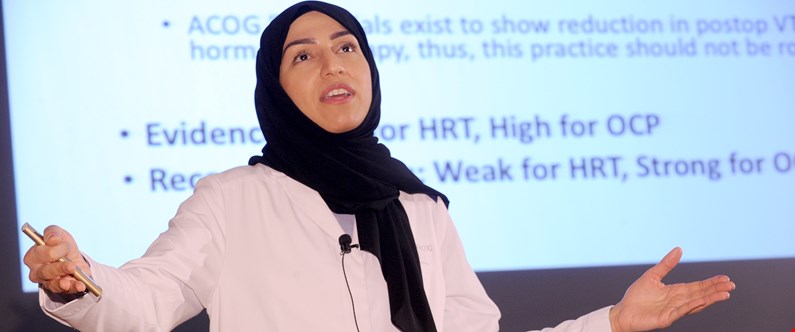Qatari WCM-Q alumnus returns to give Grand Rounds lecture on enhanced surgical recovery
 WCM-Q alumna Dr. Aisha Ahmad AA Yousuf, now medical director of reproductive surgery at Sidra Medicine, returned to her alma mater to give a Grand Rounds lecture entitled 'Enhanced Recovery in Surgery (ERAS) in Gynecology'.
WCM-Q alumna Dr. Aisha Ahmad AA Yousuf, now medical director of reproductive surgery at Sidra Medicine, returned to her alma mater to give a Grand Rounds lecture entitled 'Enhanced Recovery in Surgery (ERAS) in Gynecology'.
Strategies for achieving enhanced recovery of patients after gynecological surgery were explained at the latest Weill Cornell Medicine-Qatar Grand Rounds by one of the college’s former students.
WCM-Q graduate and Qatari national Dr. Aisha Ahmad AA Yousuf, now medical director of reproductive surgery at Sidra Medicine, returned to the college to explain the concept of enhanced recovery after surgery (ERAS), the advantages it offers patients, and its current therapeutic limitations before an audience of physicians, pharmacists, nurses and allied health professionals.
Dr. Yousuf, who was a member of WCM-Q’s first graduating class, the Class of 2008, said: “The goals of ERAS are to attenuate the surgical stress response, reduce the length of hospital stay, speed up the patient’s return to normal daily activities, and improve outcomes without increasing the rate of complications, readmissions or costs. I think of surgery as like a marathon for the patient: you must prepare them carefully beforehand, manage the stresses on the body during the procedure, and then follow a recovery process afterwards in order to achieve the best results.”
After graduating from WCM-Q, Dr. Yousuf completed the obstetrics and gynecology residency program at University of Michigan Hospital in the US. She then completed a fellowship in minimally invasive gynecologic surgery and pelvic floor reconstruction at St. Michael’s Hospital, University of Toronto.
Dr. Yousuf said that ERAS requires a multidisciplinary approach involving active participation of patients, surgeons, anesthesiologists, pain specialists, nursing staff, physical and occupational therapists, and social workers. She explained the importance of preadmission information, education and counselling to give the patient accurate expectations about the surgical and anesthetic procedures, and to ensure preoperative instructions, such as fasting and taking medications, are followed correctly.
Patients and relatives should have a chance to meet with the surgeon, anesthesiologist and nurse, and instructions should be given both verbally and in writing. These measures help to diminish misunderstanding, fear, fatigue, and pain, and enhance recovery and early discharge, she said. Special care should be taken when performing surgery on patients with pre-existing conditions such as diabetes and anemia, or who are taking medications such as hormone replacement therapy or oral contraceptives.
Dr. Yousuf said that advances in technology allowed for minimally invasive surgery, which uses very small or keyhole incisions and robotic surgical tools, had dramatically enhanced recovery outcomes. Postoperatively, incidence of nausea and vomiting – common after gynecological surgery - can be reduced by increased utilization of regional anesthesia and decreasing or eliminating use of opioid-based pain medications. Providing compression stockings and prophylaxis to reduce the risk of postoperative thrombosis also enhances recovery outcomes, as does early mobilization of the patient and early intake of food and fluids, both of which should occur within 24 hours of the surgery, she said.
Dr. Javaid Sheikh, dean of WCM-Q, said: “It gives us great pleasure to welcome Dr. Yousuf, one of our most talented alumni, back to WCM-Q to share her knowledge and expertise with us. It is wonderful to see Qatari physicians who were trained at WCM-Q return from their residency programs and fellowships overseas to contribute to Qatar’s model healthcare system. We are very proud of her and all she has achieved.”
The lecture, titled Enhanced Recovery in Surgery (ERAS) in Gynecology, was accredited locally by the Qatar Council for Healthcare Practitioners-Accreditation Department (QCHP-AD) and internationally by the Accreditation Council for Continuing Medical Education (ACCME).